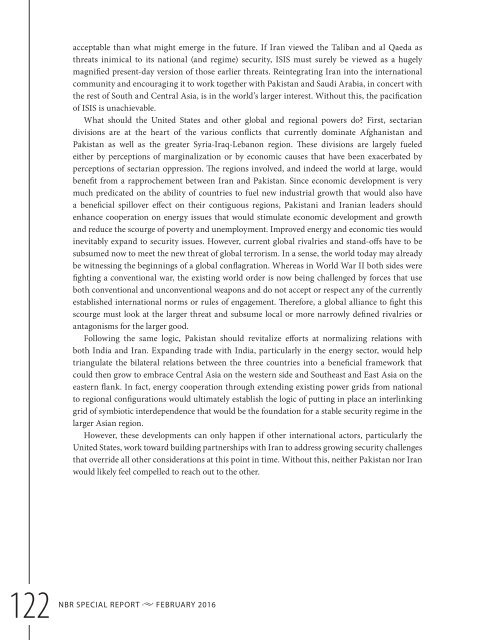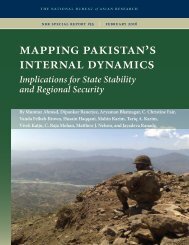pakistan’s
SR55_Mapping_Pakistan_February2016
SR55_Mapping_Pakistan_February2016
Create successful ePaper yourself
Turn your PDF publications into a flip-book with our unique Google optimized e-Paper software.
acceptable than what might emerge in the future. If Iran viewed the Taliban and al Qaeda as<br />
threats inimical to its national (and regime) security, ISIS must surely be viewed as a hugely<br />
magnified present-day version of those earlier threats. Reintegrating Iran into the international<br />
community and encouraging it to work together with Pakistan and Saudi Arabia, in concert with<br />
the rest of South and Central Asia, is in the world’s larger interest. Without this, the pacification<br />
of ISIS is unachievable.<br />
What should the United States and other global and regional powers do? First, sectarian<br />
divisions are at the heart of the various conflicts that currently dominate Afghanistan and<br />
Pakistan as well as the greater Syria-Iraq-Lebanon region. These divisions are largely fueled<br />
either by perceptions of marginalization or by economic causes that have been exacerbated by<br />
perceptions of sectarian oppression. The regions involved, and indeed the world at large, would<br />
benefit from a rapprochement between Iran and Pakistan. Since economic development is very<br />
much predicated on the ability of countries to fuel new industrial growth that would also have<br />
a beneficial spillover effect on their contiguous regions, Pakistani and Iranian leaders should<br />
enhance cooperation on energy issues that would stimulate economic development and growth<br />
and reduce the scourge of poverty and unemployment. Improved energy and economic ties would<br />
inevitably expand to security issues. However, current global rivalries and stand-offs have to be<br />
subsumed now to meet the new threat of global terrorism. In a sense, the world today may already<br />
be witnessing the beginnings of a global conflagration. Whereas in World War II both sides were<br />
fighting a conventional war, the existing world order is now being challenged by forces that use<br />
both conventional and unconventional weapons and do not accept or respect any of the currently<br />
established international norms or rules of engagement. Therefore, a global alliance to fight this<br />
scourge must look at the larger threat and subsume local or more narrowly defined rivalries or<br />
antagonisms for the larger good.<br />
Following the same logic, Pakistan should revitalize efforts at normalizing relations with<br />
both India and Iran. Expanding trade with India, particularly in the energy sector, would help<br />
triangulate the bilateral relations between the three countries into a beneficial framework that<br />
could then grow to embrace Central Asia on the western side and Southeast and East Asia on the<br />
eastern flank. In fact, energy cooperation through extending existing power grids from national<br />
to regional configurations would ultimately establish the logic of putting in place an interlinking<br />
grid of symbiotic interdependence that would be the foundation for a stable security regime in the<br />
larger Asian region.<br />
However, these developments can only happen if other international actors, particularly the<br />
United States, work toward building partnerships with Iran to address growing security challenges<br />
that override all other considerations at this point in time. Without this, neither Pakistan nor Iran<br />
would likely feel compelled to reach out to the other.<br />
122<br />
NBR<br />
SPECIAL REPORT u FEBRUARY 2016



